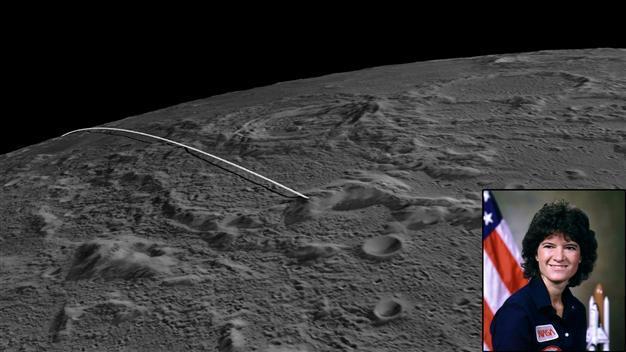NASA probes crash into the moon
WASHINGTON - Agence France-Presse

NASA has named the site, shown in this NASA illustration, where twin agency spacecraft impacted the moon on December 17, 2012 in honor of the late astronaut Sally K. Ride, who was America's first woman in space and a member of the probes' mission team. REUTERS Photo
Two NASA probes crashed into the moon yesterday after spending months gathering data by orbiting miles above the lunar surface, the US space agency said.
The site where the tiny probes, dubbed Ebb and Flow, crashed will be named after astronaut Sally Ride, the first American woman in space.
Ride, who died earlier this year, had led the GRAIL mission's MoonKam project for students from around the world to choose targets for the probes' cameras.
"Sally was all about getting the job done, whether it be in exploring space, inspiring the next generation, or helping make the GRAIL mission the resounding success it is today," GRAIL principal investigator Maria Zuber of the Massachusetts Institute of Technology in Cambridge said in a statement.
"As we complete our lunar mission, we are proud we can honor Sally Ride's contributions by naming this corner of the moon after her." Ebb and Flow slammed into the lunar surface as planned at 22:28 GMT and 22:29 GMT at a whopping 3,760 miles per hour (1.7 kilometers per second). The Sally K. Ride Impact Site is on the southern surface of a mountain near a crater named Goldschmidt.
There was no image of the crash because the area was in the dark at the time, NASA said.
The probes were destroyed after running low on fuel and sinking too low in orbit to conduct any more missions, the space agency said.
During their work life the probes took more than 115,000 images of the lunar surface, generating the highest resolution gravity map ever gathered from a celestial body.
The map will help provide a better understanding of how Earth and other rocky planets in the solar system formed and evolved, according to scientists.
"We will miss our lunar twins, but the scientists tell me it will take years to analyze all the great data they got, and that is why we came to the moon in the first place," said GRAIL project manager David Lehman of NASA's Jet Propulsion Laboratory in Pasadena, California.
"So long, Ebb and Flow, and we thank you." Launched in September 2011, Ebb and Flow had been orbiting the moon since January 1. At some points, they were flying just a few miles above the moon's tallest mountains.
Ebb and Flow fired their main engines until the tanks were empty, allowing NASA to determine precisely how much fuel is left and help improve predictions of fuel needs for future missions.
The $500 million GRAIL mission was the 110th moon exploration mission. Those missions include the six manned Apollo flights from 1969 to 1972 that saw 12 Americans land on the lunar surface.
